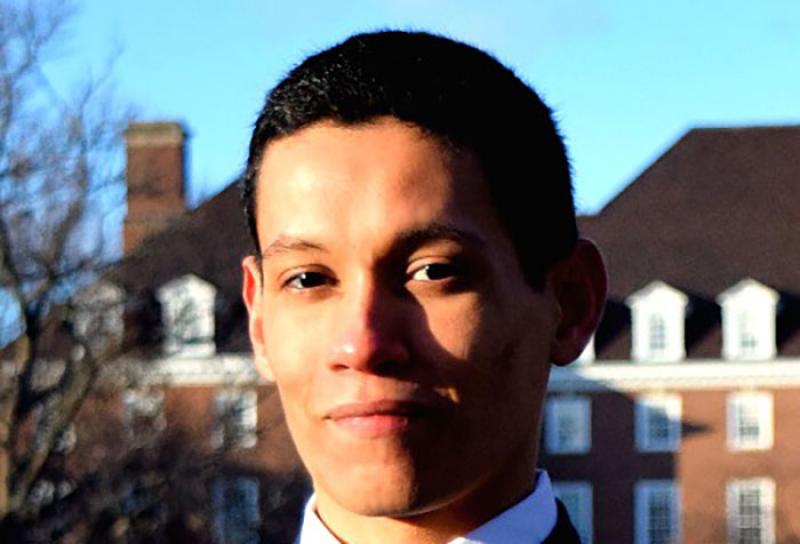
MPH student Mateo Solis Rueda discusses his APE change
Students in the Master of Public Health program in the College of Applied Health Sciences at the University of Illinois had to adjust their internships—known as Applied Practice Experiences—because of the ongoing COVID-19 pandemic. Periodically, we will speak with them about how those changes affected their summer plans and potentially career paths. Today, we speak with Mateo Solis Rueda, who worked on the contact tracing team at the Howard Brown Health Center in Chicago.
Q: How are your experiences different from what you expected?
A: My initial expectation was to be on-site at the health organization throughout the week where we would work on contact tracing as a team. I pictured having a team leader who would guide us through the process of how to properly use the online system, and promptly address issues as they occurred. However, working remotely has presented with additional challenges. Although circumstances are less than ideal, we are powering through it all, and we are still able to maintain close contact through weekly meetings which are conducted virtually to address any problems and discuss future goals and obstacles we may encounter as we continue COVID-19 contract tracing.
Q: Are you doing something for your APE other than what you trained for?
A: I feel like my coursework provided me with adequate training for my APE. In my previous courses, we have discussed extensively about collecting data from community members. Additionally, we practiced hands on creating and administering surveys, as well as collecting, analyzing, and reporting our results. It is definitely interesting to see how this unravels in the real world, and how it differs from the classroom environment.
Q: Does your APE work lead you to think about a different career path?
A: Fortunately, my APE work surrounds one of my top interests in public health, infectious diseases. I am treating this as a great opportunity to get a feel for this discipline of public health. If anything, my work so far has reinforced my interest in this career path.
Q: You’re doing contract tracing for Spanish-speaking populations, as well as English. Are there differences in how you approach the two populations?
A: Due to a high demand for contract tracing within the Spanish-speaking population, I have only spoken with individuals who speak Spanish thus far. I have been pleased with the generally kind and open demeanor of all the individuals I have spoken with, as well as their willingness in allowing me to interview them and answer all my questions. Although, I have yet to contact someone who speaks English, I have thought about similarities and differences in approaching these two populations. Overall, I would say the approach would be very similar due to having a script we must stick with, and attempting to extract the identical information.
Q: What happened to your original APE?
A: My original plan was to conduct my APE at the local public health district (CUPHD), however with some guidance and encouragement from my instructor, we decided to switch it to working on contact tracing at a different health organization. Fortunately, I am still working alongside the original public health district, though it is now my ILE.
Q: Has anything been frustrating about your change in APE status?
A: Thankfully there have not been any major frustrations. Instructors, as well as supervisors and team members at the health organizations are all aware and understanding of the current unique circumstances. It has been interesting to watch everyone within the public health field come together and continue to help in any way they can.
Q: What are you missing out on because of the pandemic, in terms of working face-to-face with people?
A: I am missing out on the potential connections that could have been made within the community. Having to phone people at various hours of the day and asking for personal information makes it challenging to establish a connection at first, as many people are initially hesitant to answer questions. To overcome this, I try my best to start off with a bit of conversation to let them know I am only checking to ensure they are doing fine, while encourage them to stay safe. This seems to work well, as everyone I have spoken with has been gracious. A second thing I am missing out on is meeting and working alongside health professionals at the health organization. I have only met them through online video meetings, which is not the same as it would be in person. This makes communicating back and forth a bit slower and less personable.
Q: What advice do you have for future students who might have disrupted internships or APEs?
A: My advice is that if you ever find yourself frustrated or stuck, take it as a sign to pause, take a step back, and occupy yourself with something you enjoy. Go out for a run, a walk, a bike ride, read, take a nap, etc. After some time has passed, come back with a fresh mind and continue where you left off. I find that when I do this, I come up with new ideas, perhaps it might work for others. I also want to mention that the instructors are around to lend help whenever needed, so do not hesitate to reach out.
Q: What other ways has COVID-19 affected you? Have you traveled? Have you been able to go home, see family?
A: Due to COVID-19, I was pushed to move back to Chicago sooner than I previously anticipated. Stay-at-home orders, and shelter-in-place regulations added additional challenges and stresses to this move. Fortunately, I have been able to stay in contact with family and friends through social media, and virtual meetups. More recently, I was able to visit family while continuing to follow health guideline and remaining safe.
